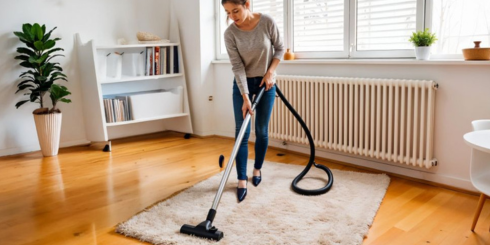Why Regular Cleaning Can Extend the Life of Your Furniture
Furniture is a significant investment in any home or office, providing both functionality and aesthetic appeal. To ensure that your furniture continues to serve you well and maintains its beauty for years, regular cleaning is essential. Many people underestimate the impact of regular maintenance, thinking that furniture only needs attention when it becomes visibly dirty. However, by the time stains and grime are noticeable, the damage may already be done. In this article, we will explore why regular cleaning is crucial for extending the life of your furniture and how it can save you money and stress in the long run.
1. Prevention of Wear and Tear
Everyday use exposes your furniture to dust, dirt, and other particles that can cause gradual wear and tear. These particles can settle into the fabric or scratch the surface of wooden and leather furniture. Over time, this accumulation can cause the material to deteriorate, leading to fraying, discoloration, and weakening of the structure. Regular cleaning removes these abrasive particles, preserving the integrity of the furniture’s material and preventing premature aging.
2. Maintaining Aesthetic Appeal
Furniture is often a focal point in a room, contributing to the overall decor and ambiance. Dust, stains, and spills can quickly diminish the visual appeal of your furniture, making the entire space look unkempt. Regular cleaning helps maintain the original look of your furniture, ensuring that colors remain vibrant, fabrics retain their texture, and wood surfaces stay polished. This not only keeps your space looking fresh but also prevents the need for costly restoration or replacement.
3. Protecting Against Allergens and Health Hazards
Dust, pet dander, and other allergens can accumulate on and within your furniture, posing health risks to you and your family. Upholstered furniture, in particular, can trap these particles, leading to allergic reactions, respiratory issues, and skin irritations. Regular cleaning, including vacuuming and spot cleaning, can significantly reduce the presence of these allergens, promoting a healthier indoor environment. Additionally, keeping your furniture clean prevents the growth of mold and mildew, which can develop in damp or humid conditions and cause serious health problems.
4. Extending the Lifespan of Upholstery
Upholstered furniture requires special care to keep it looking and feeling its best. Fabrics can be delicate and prone to staining, fading, and wearing out if not properly maintained. Regular cleaning, such as vacuuming and using appropriate cleaning agents, can help protect the fabric from damage. Removing dirt and oils that accumulate over time prevents the fibers from breaking down, ensuring that your upholstery remains soft, vibrant, and comfortable for years to come.
5. Preserving the Value of Your Furniture
Whether you plan to keep your furniture for decades or eventually sell it, maintaining its condition is key to preserving its value. Well-maintained furniture retains its resale value much better than items that show signs of neglect. Regular cleaning ensures that your furniture remains in good condition, making it more appealing to potential buyers if you decide to sell or upgrade in the future. This is particularly important for high-end or antique pieces, where condition plays a significant role in determining value.
6. Enhancing Durability of Wooden Furniture
Wooden furniture is known for its durability and timeless appeal, but it also requires regular care to maintain its strength and appearance. Dust and grime can build up on the surface of wood, leading to scratches and a dull finish. Additionally, exposure to moisture can cause wood to warp, crack, or rot. Regular cleaning with appropriate products helps protect the wood, preventing these issues and ensuring that your wooden furniture remains sturdy and beautiful for generations.
7. Reducing the Need for Repairs
Neglecting to clean your furniture regularly can lead to damage that requires costly repairs. For example, allowing dirt and grime to build up on leather can cause it to crack and peel, while neglecting to clean wooden surfaces can result in scratches that need refinishing. By keeping your furniture clean, you can avoid these issues and the associated repair costs. Regular maintenance is a small investment of time and effort that can save you money and prolong the life of your furniture.
8. Protecting Leather Furniture
Leather furniture exudes luxury and comfort, but it also requires regular care to maintain its look and feel. Without proper cleaning and conditioning, leather can dry out, crack, and lose its supple texture. Regularly wiping down leather furniture with a damp cloth and using leather conditioner helps keep the material soft and prevents damage. This simple routine can significantly extend the life of your leather furniture, preserving its beauty and comfort for years.
9. Preventing Stains and Spills
One of the most common causes of damage to furniture is stains and spills. Whether it’s a coffee spill on the couch or a water ring on the dining table, these accidents can leave lasting marks if not addressed promptly. Regular cleaning, including spot treatments and protective coatings, can prevent stains from setting in and becoming permanent. Being proactive about cleaning up spills as soon as they occur will protect your furniture from unsightly marks and keep it looking new.
10. Enhancing Indoor Air Quality
Your furniture, especially upholstered pieces, can act as a filter, trapping dust, dirt, and pollutants from the air. Over time, these particles can be released back into the air, contributing to poor indoor air quality. Regular cleaning of your furniture helps remove these trapped particles, improving the air quality in your home. This is particularly important for those with allergies or respiratory conditions, as cleaner air can lead to better health and comfort.
11. Maintaining the Structural Integrity
The structural integrity of your furniture is crucial to its longevity. Dust and dirt that accumulate in the joints and crevices of furniture can cause the materials to weaken and break down over time. Regular cleaning, including dusting and tightening any loose components, helps maintain the structural strength of your furniture. This ensures that your furniture remains safe and functional for everyday use, reducing the risk of accidents or the need for replacement.
12. Promoting Longevity with Regular Conditioning
Certain materials, such as wood and leather, benefit from regular conditioning in addition to cleaning. Conditioning helps to replenish natural oils that can be lost over time, preventing drying and cracking. For example, wood furniture can be treated with a quality wood conditioner to keep it moisturized and protected from environmental factors. Leather furniture, as mentioned earlier, should be conditioned regularly to maintain its softness and flexibility. These extra steps go a long way in extending the life of your furniture.
13. Improving Comfort and Usability
Clean furniture is more comfortable to use. Dust and dirt can make fabric feel rough and uninviting, while accumulated grime can make surfaces sticky or unpleasant to touch. Regular cleaning ensures that your furniture remains comfortable and enjoyable to use, enhancing your overall experience at home or in the office. Whether you’re relaxing on the couch or working at a desk, clean furniture contributes to a more pleasant and productive environment.
14. Eco-Friendly Benefits
Extending the life of your furniture through regular cleaning is also an eco-friendly choice. By taking care of your existing furniture, you reduce the need to purchase new items, which in turn reduces the demand for raw materials and energy used in manufacturing. Additionally, well-maintained furniture is less likely to end up in a landfill, contributing to a more sustainable lifestyle. Regular cleaning is a simple yet effective way to reduce your environmental footprint.
15. Creating a Welcoming Atmosphere
Clean furniture not only looks better but also creates a more welcoming atmosphere in your home or office. Guests and clients will appreciate the attention to detail, feeling more comfortable and at ease in a clean and well-maintained space. Whether you’re hosting a dinner party or conducting a business meeting, the condition of your furniture plays a significant role in the impression you make on others. Regular cleaning ensures that your furniture always looks its best, contributing to a positive and inviting environment.
16. Easy Maintenance with Regular Cleaning
One of the biggest advantages of regular cleaning is that it makes maintenance easier in the long run. When you clean your furniture regularly, dirt and stains don’t have a chance to accumulate and become difficult to remove. This means that each cleaning session is quicker and less labor-intensive, allowing you to enjoy a clean home with minimal effort. Regular cleaning also helps you stay on top of any potential issues, such as small stains or loose screws, before they become bigger problems.
17. Cost-Effective Solution
Investing in regular cleaning is a cost-effective solution compared to the expense of replacing damaged furniture. While it may seem like a chore, the time and money saved by avoiding costly repairs or replacements make regular cleaning a worthwhile investment. Additionally, maintaining your furniture’s appearance and condition can increase its resale value, providing a financial return if you decide to sell it in the future.
18. Protecting Against Pests
Furniture, particularly upholstered pieces, can attract pests such as dust mites, bed bugs, and moths if not properly maintained. These pests can cause significant damage to the fabric and structure of your furniture, leading to costly repairs or replacements. Regular cleaning, including vacuuming and inspecting for signs of pests, can help prevent infestations and protect your furniture from damage. Keeping your furniture clean and pest-free ensures that it remains safe and comfortable to use.
19. Preserving Sentimental Value
Many pieces of furniture hold sentimental value, whether they are family heirlooms, gifts, or items that have been with you for many years. Regular cleaning helps preserve these cherished pieces, ensuring that they can be enjoyed by future generations. By taking the time to care for your furniture, you protect not only its material value but also the memories and stories associated with it.
20. Conclusion: The Importance of Regular Cleaning
In conclusion, regular cleaning is essential for extending the life of your furniture. It prevents wear and tear, maintains aesthetic appeal, protects against allergens and pests, and preserves the value and comfort of your furniture. By investing a little time and effort into regular maintenance, you can enjoy your furniture for many years, save money on repairs and replacements, and create a healthier and more inviting living environment. Don’t wait until your furniture shows signs of damage—start a regular cleaning routine today and reap the benefits for years to come.


